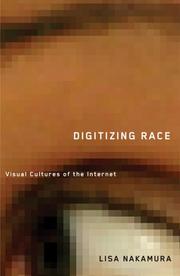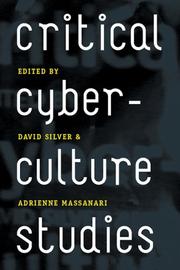| Listing 1 - 7 of 7 |
Sort by
|

ISBN: 0415938376 0415938368 0203953363 1135222053 0203699181 1135222061 9781135222062 9780415938365 9780415938372 0415919797 9780415919791 9780203953365 Year: 2002 Publisher: New York (N.Y.) Routledge
Abstract | Keywords | Export | Availability | Bookmark
 Loading...
Loading...Choose an application
- Reference Manager
- EndNote
- RefWorks (Direct export to RefWorks)
First published in 2002. Routledge is an imprint of Taylor & Francis, an informa company.
Mass communications --- Computer architecture. Operating systems --- National movements --- Race awareness --- Race discrimination --- Internet --- Cyberspace --- -#SBIB:309H103 --- Space and time --- Computers --- Telematics --- Bias, Racial --- Discrimination, Racial --- Race bias --- Racial bias --- Racial discrimination --- Discrimination --- Awareness --- Ethnopsychology --- Ethnic attitudes --- Social aspects. --- Social aspects --- Mediatechnologie / ICT / digitale media: sociale en culturele aspecten --- Race awareness. --- Race discrimination. --- #SBIB:309H103

ISBN: 9780816646135 0816646139 9780816646128 0816646120 Year: 2008 Volume: 23 Publisher: Minneapolis : University of Minnesota,
Abstract | Keywords | Export | Availability | Bookmark
 Loading...
Loading...Choose an application
- Reference Manager
- EndNote
- RefWorks (Direct export to RefWorks)
In the nineties, neoliberalism simultaneously provided the context for the Internet's rapid uptake in the United States and discouraged public conversations about racial politics. At the same time many scholars lauded the widespread use of text-driven interfaces as a solution to the problem of racial intolerance. Today's online world is witnessing text-driven interfaces such as e-mail and instant messaging giving way to far more visually intensive and commercially driven media forms that not only reveal but showcase people's racial, ethnic, and gender identity. Lisa Nakamura, a leading scholar in the examination of race in digital media, uses case studies of popular yet rarely examined uses of the Internet such as pregnancy Web sites, instant messaging, and online petitions and quizzes to look at the emergence of race-, ethnic-, and gender-identified visual cultures. While popular media such as Hollywood cinema continue to depict nonwhite nonmales as passive audiences or consumers of digital media rather than as producers, Nakamura argues the contrary--with examples ranging from Jennifer Lopez music videos; films including the Matrix trilogy, Gattaca', and Minority Report'; and online joke sites--that users of color and women use the Internet to vigorously articulate their own types of virtual community, avatar bodies, and racial politics. Lisa Nakamura is associate professor of speech communication and Asian American studies at the University of Illinois, Urbana-Champaign. She is the author of Cybertypes: Race, Ethnicity, and Identity on the Internet' and coeditor, with Beth Kolko and Gilbert Rodman, of Race in Cyberspace'.
Information society. --- Internet and culture. --- Internet and race. --- Internet --- Internet. --- Visual communication. --- Social aspects. --- 82:62 --- Literatuur en technologie --- 82:62 Literatuur en technologie --- Information society --- Internet and culture --- Internet and race --- Visual communication --- Graphic communication --- Imaginal communication --- Pictorial communication --- Communication --- Sociology --- Information superhighway --- Social aspects --- Race. --- Race relations. --- Gender identity. --- Ethnicity. --- Computer communications & networking --- Internet - Social aspects
Book
Year: 2002 Publisher: New York: Routledge,
Abstract | Keywords | Export | Availability | Bookmark
 Loading...
Loading...Choose an application
- Reference Manager
- EndNote
- RefWorks (Direct export to RefWorks)
Cyberspace entices us with the promise of an online utopia--a web of fluid identities and infinite possibilities. When we look for signs of freedom online--anywhere from chat room conversations to cyberpunk fiction--we are almost inevitably urged toward "liberation" from our bodies and their "restrictive" attributes like race, gender, and age. But cyberculture critic Lisa Nakamura insists that the Internet is a place where race matters. Race itself may not be fixed or finite, but Nakamura argues that racial stereotypes-or "cybertypes"--Are hardwired into our online interactions: Identity tourists masquerade in virtual roles like Asian_Geisha and Alatinolover. Web directories sharply narrow racial categories. Anonymous computer users are assumed to be white. In Cybertypes, Nakamura looks at what happened to race when it went online, and how our ideas about race continue to be shaped and reshaped every time we log on. Examining all facets of our everyday online experience from Internet advertising to email jokes, Nakamura shows that the postmodern ideal of fluid selves made possible by network technology is not necessarily subversive, progressive, or liberating. The harder race is pushed off-line, the greater the consequences in real life for people of color. A lively and provocative discussion Cybertypes offers a valuable new way of thinking about race and identity in the information age.
Identité culturelle --- Représentation --- Média --- Internet --- Sociologie de la culture
Book
ISBN: 9780415802352 9780415802369 Year: 2012 Publisher: New York Routledge
Abstract | Keywords | Export | Availability | Bookmark
 Loading...
Loading...Choose an application
- Reference Manager
- EndNote
- RefWorks (Direct export to RefWorks)
"Digital media technologies like the Internet create and host the social networks, virtual worlds, online communities, and media texts where it was once thought that we would all be the same, anonymous users with infinite powers. Instead, the essays in Race After the Internet show us that the Internet and other computer-based technologies are complex topographies of power and privilege, made up of walled gardens, new (plat)forms of economic and technological exclusion, and both new and old styles of race as code, interaction, and image. Investigating how racialization and racism are changing in web 2.0 digital media culture, Race After the Internet contains interdisciplinary essays on the shifting terrain of racial identity and its connections to digital media, including Facebook and MySpace, YouTube and viral video, WiFi infrastructure, the One Laptop Per Child (OLPC) program, genetic ancestry testing, DNA databases in health and law enforcement, and popular online games like World of Warcraft. Ultimately, the collection broadens the definition of the "digital divide" in order to convey a more nuanced understanding of usage, meaning, participation, and production of digital media technology in light of racial inequality. "-- "Race After the Internet explores racial identity in the digital age, grappling with the complex role that the Internet and other digital technologies play in shaping our ideas about race. The readings are separated into sections that examine how digital media has complicated racial identity as well as the connection between limited digital access and social inequality. Other essays address new racial identities created by users of popular media of virtual worlds like World of Warcraft, and social networks like Facebook and MySpace. And a final group of essays enters the world of biotechnology to find ways that biometrics and new surveillance technologies are creating different forms of racial profiling. Race After the Internet investigates how racialization and racism are changing in web 2.0 digital media culture, thus making it a valuable text for anyone interested in digital media and race and ethnic studies.The essays incorporate science and technology studies, social scientific, rhetorical, textual, theoretical, and ethnographic approaches with some carefully selected demographic studies of Internet and technology use. This collection aims to broaden the definition of the "digital divide" in order to convey a more nuanced understanding of usage, meaning, participation, and production of digital media technology in light of racial inequality"--
Internet --- Race --- Race relations --- Social aspects


ISBN: 9780814708903 9780814740231 Year: 2006 Publisher: New York, N.Y. New York University Press
Abstract | Keywords | Export | Availability | Bookmark
 Loading...
Loading...Choose an application
- Reference Manager
- EndNote
- RefWorks (Direct export to RefWorks)
Digital

ISBN: 9780814708491 9780814725313 Year: 2014 Publisher: New York, N.Y. New York University Press
Abstract | Keywords | Export | Availability | Bookmark
 Loading...
Loading...Choose an application
- Reference Manager
- EndNote
- RefWorks (Direct export to RefWorks)
Digital

ISBN: 9781479867455 9781479897964 Year: 2020 Publisher: New York, N.Y. New York University Press
Abstract | Keywords | Export | Availability | Bookmark
 Loading...
Loading...Choose an application
- Reference Manager
- EndNote
- RefWorks (Direct export to RefWorks)
| Listing 1 - 7 of 7 |
Sort by
|

 Search
Search Feedback
Feedback About UniCat
About UniCat  Help
Help News
News